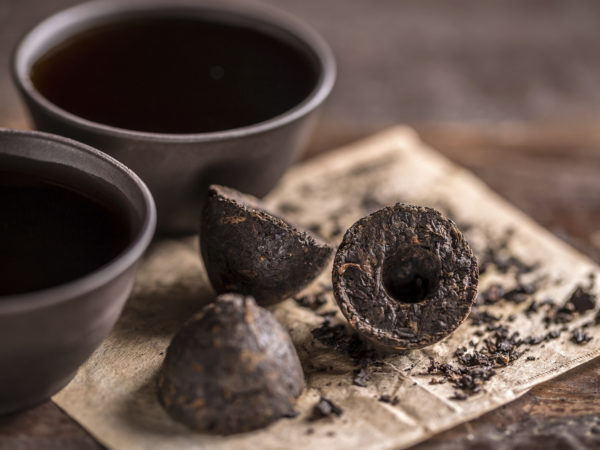What is Pu-erh Tea?
I recently tried some pu-erh tea and liked it a lot. I’d never heard of it before. Can you tell me something about it? Does it have any health benefits?
Andrew Weil, M.D. | May 28, 2012

Pu-erh tea (pronounced POO-air) is the most oxidized form of tea, often aged, and sometimes very expensive. Unlike other teas, which get stale over time, pu-erh can mellow and improve with age like fine wine. Some pu-erh teas are more than 50 years old, and rare pu-erh teas sell for many thousands of dollars in Asian specialty stores.
Pu-erh teas come from China’s Yunnan Province and are named for a city in southern Yunnan. These teas are highly valued in China where the processing methods have been a well-guarded secret for centuries. Pu-erh’s distinct flavor comes from the fact that after the leaves are picked, they are made into a sundried base tea called maocha and then fermented. After that, the leaves are aged and then packed into bricks or cakes.
You brew pu-erh tea the same as you would brew black and oolong teas. Heat good quality water to a vigorous boil. Pour the water over the tea leaves (which can be loose or in a tea ball or strainer), wait 10 seconds, then discard the water. This “opens” the leaves. Add more water and steep long enough to develop color and flavor but not so long that the tea will taste tastes bitter. For pu-erh, two to five minutes is best. Depending on the variety, the color of the brewed tea can be pale yellow, golden, red, or dark brown. Some brewed pu-erh varieties look like coffee and taste very earthy, but connoisseurs often dismiss these as low quality. You can reuse good quality tea leaves several times; tea lovers say that the subsequent infusions taste better and better.
As for pu-erh tea benefits, because it is fully oxidized, pu-erh has a lower antioxidant content than white or green tea, but Chinese people credit it with many health benefits, especially promotion of weight loss, reduction of serum cholesterol, and cardiovascular protection. Not many scientific studies exist on pu-erh tea, so we don’t know how valid these health claims are. Some research suggests that pu-erh may help lower cholesterol and reduce heart disease risk, but this hasn’t been confirmed in humans. A Chinese study performed on rats and published in 2009 showed lowering of LDL (“bad”) cholesterol and triglyceride levels after the animals were fed a pu-erh tea extract, along with an increase in HDL (“good” cholesterol). We know that tea, in general, is protective against heart disease and cancer. It’s likely that pu-erh tea has similar effects.
I am a great fan of quality pu-erh, and have had the good fortune to sample some exquisite varieties during my travels in China. Fortunately, good pu-erh is becoming easier to find in this country. Exploring these complex, venerable teas is a healthy and rewarding pursuit that I highly recommend.
Andrew Weil, M.D.









